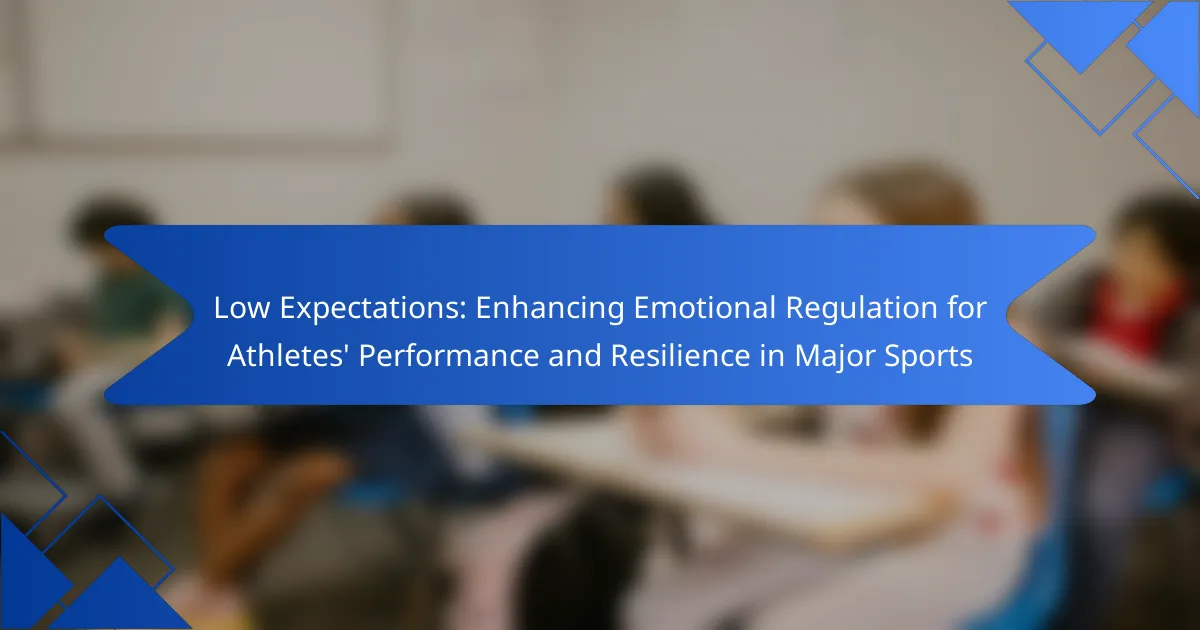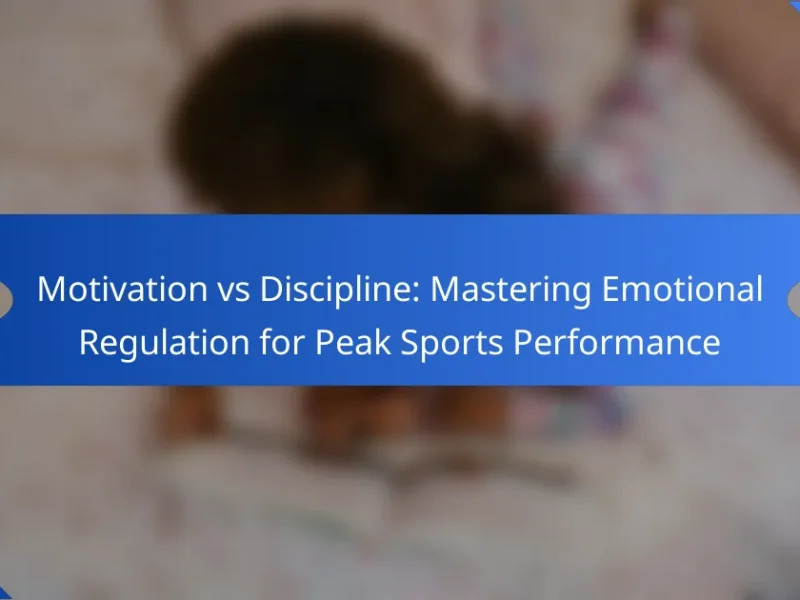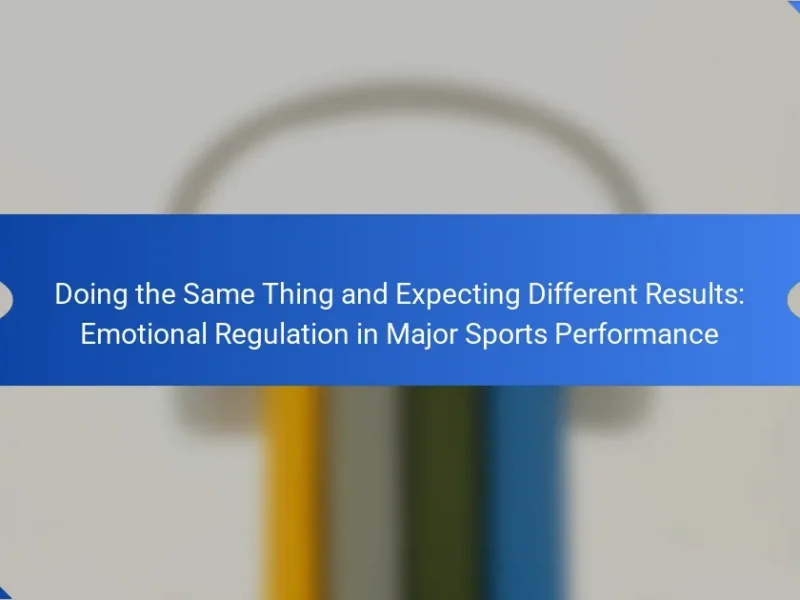Low expectations can significantly enhance emotional regulation for athletes, reducing performance anxiety and fostering resilience. This approach emphasizes process over outcome, encouraging incremental progress and a growth mindset. Key strategies include mindfulness practices and cognitive reframing, which help athletes maintain focus and manage stress effectively. By adopting low expectations, athletes can improve their performance in high-pressure situations.

How do low expectations influence emotional regulation in athletes?
Low expectations can enhance emotional regulation in athletes by reducing pressure and fostering resilience. This approach encourages a focus on incremental progress rather than perfection, leading to improved performance. Athletes with low expectations often experience less anxiety, allowing them to manage their emotions more effectively during competitions. Studies indicate that embracing low expectations can create a more stable mental state, which is crucial for optimal performance in high-stakes situations. This strategy not only aids in emotional regulation but also cultivates a growth mindset, enhancing overall athletic resilience.
What are the psychological effects of low expectations on performance?
Low expectations can negatively impact performance by reducing motivation and increasing anxiety. Athletes may feel less pressure but may also lack the drive to excel. This mindset can lead to a cycle of underachievement and hinder emotional regulation. Research indicates that maintaining a balanced perspective on expectations can enhance resilience and performance in major sports.
How can low expectations enhance resilience in sports?
Low expectations can enhance resilience in sports by reducing performance pressure and fostering emotional regulation. Athletes who maintain low expectations are less likely to experience anxiety, allowing them to focus on their performance rather than outcomes. This mindset encourages a growth-oriented approach, where setbacks are perceived as learning opportunities. Studies show that athletes with lower expectations often display greater adaptability, leading to improved long-term performance. Additionally, this perspective can cultivate a supportive team environment, reinforcing collective resilience.
What are the mechanisms behind resilience development?
Low expectations can enhance emotional regulation, which is crucial for resilience development in athletes. This mechanism involves several interconnected processes. First, low expectations reduce performance anxiety, allowing athletes to focus on their skills rather than fear of failure. Second, this mindset promotes a growth-oriented approach, encouraging athletes to view challenges as opportunities for improvement. Third, emotional regulation strategies, such as mindfulness and self-compassion, help athletes manage stress and maintain composure during competitions. These factors collectively foster resilience, enabling athletes to bounce back from setbacks and perform consistently at high levels.

What are the universal attributes of emotional regulation systems in sports?
Emotional regulation systems in sports universally emphasize awareness, control, and adaptability. These attributes enhance athletes’ performance and resilience by fostering a positive mindset. Awareness allows athletes to recognize emotional triggers, while control helps them manage responses effectively. Adaptability ensures athletes can adjust strategies based on real-time feedback, contributing to sustained performance under pressure.
How do emotional regulation strategies impact athletic performance?
Emotional regulation strategies significantly enhance athletic performance by fostering resilience and focus. Low expectations can reduce pressure, enabling athletes to perform optimally. Research shows that athletes who manage emotions effectively experience improved concentration and decreased anxiety, leading to better outcomes. Implementing techniques such as mindfulness and cognitive restructuring further supports emotional stability, enhancing overall performance in major sports.
What role does self-awareness play in emotional regulation?
Self-awareness significantly enhances emotional regulation in athletes by allowing them to recognize and manage their emotions effectively. This skill leads to improved performance and resilience in high-pressure sports environments. Athletes with heightened self-awareness can identify emotional triggers and adjust their responses, fostering a calm mindset. As a result, they can maintain focus and make better decisions during competitions. Studies indicate that self-aware athletes often experience lower anxiety levels, which contributes to their overall performance and mental well-being.
How can athletes develop emotional intelligence?
Athletes can develop emotional intelligence by practicing self-awareness, self-regulation, and empathy. These skills enhance emotional regulation, improving performance and resilience in high-pressure situations.
Self-awareness involves recognizing emotions and their impact on actions. Athletes can enhance this by reflecting on their emotional responses during training and competition.
Self-regulation allows athletes to manage their emotions effectively. Techniques like mindfulness and breathing exercises help maintain composure under stress.
Empathy fosters better communication with teammates and coaches, leading to improved teamwork. Engaging in active listening and understanding others’ perspectives can strengthen these relationships.
Lastly, regular feedback from coaches can provide insights into emotional strengths and areas for improvement, reinforcing the development of emotional intelligence.

What unique attributes set apart low expectations in emotional regulation?
Low expectations uniquely enhance emotional regulation by fostering resilience and reducing performance anxiety. Athletes with low expectations often experience less pressure, allowing them to focus on their skills and strategies. This mindset can lead to improved performance outcomes, as they are less likely to be hindered by fear of failure. Additionally, low expectations encourage a growth-oriented approach, where athletes view challenges as opportunities for development rather than threats. This perspective can significantly bolster their emotional stability during high-stakes situations.
How can reframing expectations lead to better outcomes?
Reframing expectations can significantly enhance athletes’ emotional regulation, leading to improved performance and resilience. By adopting a mindset of low expectations, athletes can reduce pressure, allowing for more focused and relaxed performances. This approach fosters adaptability in high-stress environments, promoting better decision-making and emotional stability. As a result, athletes experience less anxiety and greater enjoyment in their sport, ultimately contributing to sustained success over time.
What are the specific techniques for managing low expectations?
To manage low expectations effectively, athletes should employ techniques such as reframing their mindset, setting realistic goals, and focusing on process-oriented outcomes. Reframing involves viewing challenges as opportunities for growth. Setting realistic goals ensures expectations align with current capabilities. Focusing on process-oriented outcomes emphasizes effort and improvement rather than solely on results, fostering resilience. Each of these techniques enhances emotional regulation, ultimately improving performance in major sports.
How can visualization techniques aid emotional regulation?
Visualization techniques enhance emotional regulation by helping athletes manage stress and improve focus. These techniques, such as mental imagery and guided visualization, allow athletes to envision successful performances, reducing anxiety and fostering a positive mindset. As a result, athletes can better cope with pressure during competitions. Research indicates that consistent practice of visualization can lead to improved resilience, enabling athletes to bounce back from setbacks more effectively. This unique approach not only aids in emotional control but also enhances overall performance in major sports.
What role does goal-setting play in managing expectations?
Goal-setting is crucial in managing expectations as it provides clarity and direction. By establishing specific, measurable goals, athletes can align their performance with realistic outcomes, enhancing emotional regulation. This process reduces anxiety and frustration, fostering resilience. Research shows that athletes with clear goals demonstrate improved focus and motivation, leading to better performance in major sports.

What rare attributes can enhance emotional regulation in high-pressure situations?
Low expectations can enhance emotional regulation in high-pressure situations by reducing performance anxiety. This mindset allows athletes to focus on the process rather than the outcome. Rare attributes that contribute to this include mindfulness practices, which help maintain present-moment awareness, and cognitive reframing, which shifts negative thoughts into positive perspectives. These techniques empower athletes to manage stress effectively, leading to improved resilience and performance.
How do unexpected challenges affect emotional responses?
Unexpected challenges can heighten emotional responses, impacting athletes’ performance and resilience. Low expectations may enhance emotional regulation, enabling better coping strategies. Athletes with lower expectations often experience less pressure, leading to improved focus and adaptability during unforeseen circumstances. Research shows that emotional resilience is crucial in sports, as it allows athletes to navigate setbacks effectively. By fostering a mindset of low expectations, athletes can maintain composure and optimize their performance under stress.
What are the benefits of adaptive coping strategies?
Adaptive coping strategies enhance emotional regulation, leading to improved performance and resilience in athletes. These strategies help athletes manage stress and maintain focus during competitions. Low expectations can reduce pressure, allowing athletes to perform more freely. As a result, athletes experience greater satisfaction and motivation, fostering long-term engagement in their sport.
How can mindfulness practices be integrated into training?
Mindfulness practices can be integrated into training by incorporating specific techniques that enhance emotional regulation. Techniques such as breath control, body scanning, and focused attention can help athletes manage stress and improve performance. Regular practice fosters resilience, allowing athletes to maintain composure during high-pressure situations. Additionally, integrating mindfulness into warm-up routines can create a focused mindset, optimizing training outcomes.

What best practices can athletes implement to enhance emotional regulation?
Athletes can enhance emotional regulation by setting low expectations, focusing on process over outcomes, and practicing mindfulness. These strategies build resilience and improve performance under pressure. Low expectations reduce anxiety, allowing athletes to concentrate on their training and skills. Mindfulness techniques, such as meditation, help maintain focus and emotional balance, leading to better decision-making during competitions. Additionally, developing a support network fosters emotional resilience, providing athletes with resources to cope with stress.
How can coaches support athletes in managing expectations?
Coaches can support athletes by fostering a culture of low expectations, promoting emotional regulation. This approach helps athletes focus on personal growth rather than external pressures, enhancing resilience. For instance, encouraging athletes to set realistic, achievable goals cultivates a positive mindset. Additionally, providing consistent feedback and emotional support allows athletes to navigate challenges effectively. Regular mental conditioning sessions can further reinforce coping strategies, ensuring athletes manage their expectations constructively.
What common mistakes should athletes avoid in emotional regulation?
Athletes should avoid unrealistic expectations, negative self-talk, and lack of coping strategies to enhance emotional regulation. Low expectations can lead to increased resilience and performance. Unrealistic expectations often result in disappointment and anxiety, hindering focus. Negative self-talk undermines confidence and can create a cycle of poor performance. Lastly, lacking effective coping strategies prevents athletes from managing stress, impacting their emotional state during competition.
What expert insights can guide emotional regulation strategies?
Low expectations can enhance emotional regulation in athletes by promoting resilience and performance. Experts suggest setting realistic goals to reduce anxiety and improve focus. This strategy fosters a growth mindset, allowing athletes to learn from setbacks without overwhelming pressure. Research indicates that athletes who manage expectations effectively experience increased confidence and adaptability during competitions. By embracing low expectations, athletes can maintain emotional stability, leading to better overall performance.


